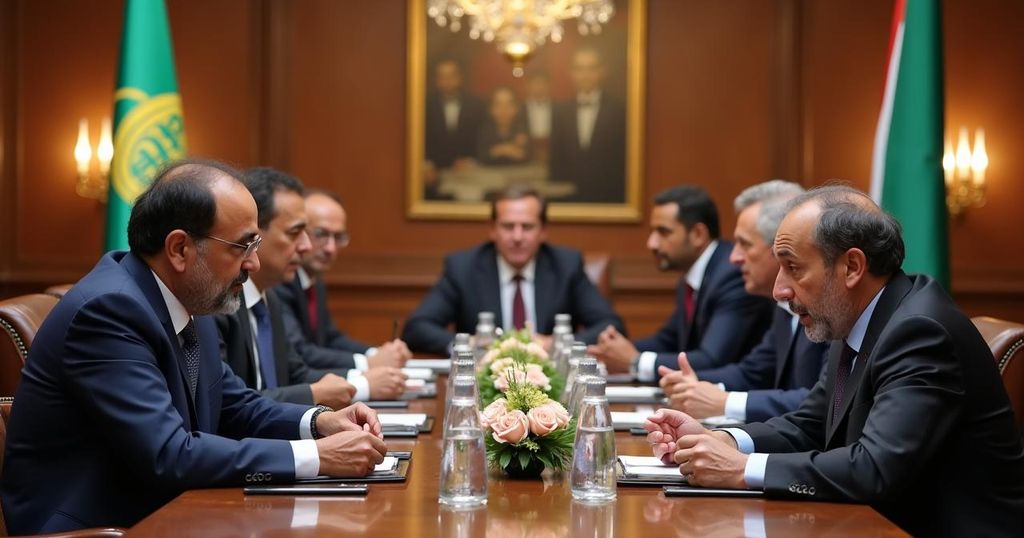Egypt is forming a new security alliance with Somalia and Eritrea, intensifying tensions with Ethiopia. Egyptian President Sisi’s recent visit to Eritrea aims to fortify cooperation among the three nations amidst accusations against Ethiopia of territorial aggression. The alliance may enhance Somalia’s security against Ethiopia, while Egypt seeks to isolate Ethiopia due to concerns over the Grand Ethiopian Renaissance Dam. This evolving dynamic could reduce prospects for future negotiations between Somalia and Ethiopia.
Egypt is advancing a loose security alliance involving Somalia and Eritrea, a move likely to heighten tensions in the Horn of Africa. Egyptian President Abdel Fattah al-Sisi recently visited Asmara, Eritrea, for trilateral discussions with Somali President Hassan Sheikh Mohamud and Eritrean leader Isaias Afwerki. The primary focus of this meeting was to enhance bilateral relations and address stability in the Horn of Africa and the Red Sea region, with expectations of a tripartite summit. Prior to Sisi’s arrival, Mohamud and Afwerki engaged in talks to discuss shared regional and international concerns, emphasizing mutual protection against perceived threats from Ethiopia. The Eritrean Ministry of Information noted the significance of strengthening cooperation to maintain the sovereignty and integrity of Somalia. In recent years, Eritrea has been training members of the Somali National Army, yet Egypt’s involvement has raised alarms. Egypt has established a defense cooperation agreement with Somalia, pledging to train Somali troops and provide military equipment as part of a new African Union mission set to replace the current AU Transitional Mission in Somalia (Atmis), which concludes its mandate this December. This agreement has occurred amid Somalia’s efforts to exclude Ethiopia from future security arrangements, stemming from accusations against Ethiopia of territorial encroachment. A notable incident occurred in January when Ethiopia signed a contentious memorandum with Somaliland, aiming to secure access to a naval base under the premise of recognizing Somaliland’s independence, leading to strong protests from Mogadishu. Somalia has consistently accused Ethiopia of engaging in unlawful arms transfers into its territory and intends to cease Ethiopian military arrangements in Somalia. Meanwhile, Ethiopia has warned Egypt against supplying military equipment to a nation with inadequate arms oversight, fearing this could empower militant groups such as al-Shabaab. The formation of an alliance among Egypt, Somalia, and Eritrea represents varied interests for each nation. For Somalia, it means enhanced security against Ethiopia, deemed a significant adversary. For Egypt, such an alliance translates to heightened security in the Red Sea and strategic isolation of Ethiopia, viewed as a nemesis due to the Grand Ethiopian Renaissance Dam project on the Nile. Eritrea, on its part, perceives this collaboration as an opportunity to counter Ethiopia following a historical conflict and recent diplomatic rifts. The prospects of negotiations between Somalia and Ethiopia may diminish due to this newly formed alliance, notably as Turkey previously attempted to mediate between the two countries regarding the Somaliland Memorandum. Moreover, as Egypt historically relies on Red Sea traffic associated with the Suez Canal for its revenue, growing security threats in the region, coupled with Ethiopia’s ambitions for a maritime presence off Somaliland, exacerbate Cairo’s concerns. Previously, Ethiopia, Somalia, and Eritrea had sought to create a regional alliance within the Horn of Africa. However, the evolving dynamics now exclude Addis Ababa from this collaboration.
The tensions surrounding the Horn of Africa have been long-standing, with historical conflicts shaping relationships among the nations. Recently, the involvement of Egypt, Somalia, and Eritrea within a new security alliance marks a significant shift in inter-state relations, particularly against the backdrop of rising concerns regarding Ethiopia’s growing influence in the region. Prior incidents, such as Ethiopia’s agreements with Somaliland, have heightened Somalia’s grievances, further complicating diplomatic engagements. The nexus of security, territorial integrity, and military cooperation comes to the forefront as these nations navigate their complex geopolitical landscape, which encompasses issues ranging from insurgent activity to the management of shared water resources along the Nile.
In conclusion, the initiative for a new trilateral security alliance among Egypt, Somalia, and Eritrea signals a potential escalation in tensions with Ethiopia, reshaping alliances in the Horn of Africa. This coalition aims to bolster security cooperation amidst increasing regional threats, particularly relating to territorial integrity and military dynamics. However, Egypt’s strategic interests in countering Ethiopia regarding the Nile River and the implications of military support to Somalia present critical challenges. As diplomatic initiatives evolve, the role of external mediators, historical grievances, and the overarching issues of stability and territorial rights will significantly impact the regional security landscape.
Original Source: nation.africa






